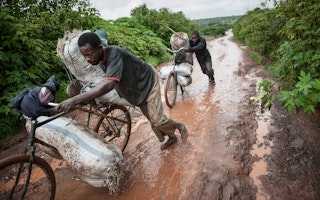A Community Rallies Against Racial Discrimination in Denmark
By Susheela Math

When Danish counsel Eddie Khawaja spoke before the Court of Justice of the European Union in Luxembourg on September 30, 2024, he ended his presentation with a quote from Muhammad Aslam, who had lived in his home in Mjølnerparken, Copenhagen, for over 30 years:
“I moved to Denmark when I was only seven years old. I never could have imagined that my own country would do this to me. I have four children who were born here, all of whom are professionals: a lawyer, engineer, psychologist and social worker. No matter how well we do, we will all still be defined by the term ‘non-Western.’ Now we have lost the home that my children were raised in. Nothing can replace our treasured family home which was full of those special memories, it’s just not the same.”

The Court’s Grand Chamber of 15 judges and the Advocate General had gathered to hear two joined cases, one of which was brought by residents from Mjølnerparken, Copenhagen, including Aslam. The residents are challenging a government-approved plan entailing the sale of over 200 family homes, imposed on the area under Denmark’s “Ghetto Package” of laws. These laws were passed in 2018, according to the government, in order to “eradicate ghettos”: residential areas with the hallmark feature that the majority of their residents are classed as being of “non-Western” background.
As a result, thousands across Denmark are losing their homes. These include Aslam, who was present in court along with around 50 other Danes who had also made the journey to Luxembourg, mostly by way of a lengthy bus journey. The tireless efforts and bravery of residents, activists, campaigners, and community organizations to stand up to racial discrimination and economic injustice were on full display both outside and inside the courthouse.
The hearing represented the culmination of years of work, with the Open Society Justice Initiative’s involvement having commenced back in the summer of 2018. The Justice Initiative had worked on racial justice in Europe for over a decade already and we were well aware of the rising trends of growing Islamophobia and “area-based discrimination” targeting majority ethnic minority neighborhoods.

However, Denmark’s 2018 move introducing the package was the most egregious, explicit example. The classification of “non-Western” background is not in fact based on geography and it applies to Danish citizens and those born and raised in the country. The policies were justified by the government as efforts to “eliminate parallel societies,” which they said were caused by “religious and other values” that are “different from” the (white and Christian) Danish “majority.”
Real social change is most often driven by movements and those who are impacted are best placed to advise on what is needed to remedy the situation. The first day of our consultations took us to Mjølnerparken, classed by the government as a “tough ghetto.” Far from the derogatory rhetoric of the politicians, we found it otherwise: “a pleasant neighborhood with a good community spirit,” as has since been noted by the European Commission Against Racism and Intolerance. Families had lived there for decades, growing up together and supporting each other throughout. They were distraught at the prospect of losing their homes and wanted to take preventative legal action.

The community spirit lived on following this, with the residents including Majken Felle engaging in Herculean collective efforts to resist. The Open Society Justice Initiative and Danish counsel, Eddie Khawaja and Petra Fokdal, worked alongside affected communities and organizations Almen Modstand and the Centre for Muslims’ Rights in Denmark to seek to embed litigation within this wider resistance across the country.
The case was filed in the midst of the pandemic in May 2020, when despite the sanctity of the home being highlighted across the globe, Denmark insisted on pushing ahead with its plans. Despite the challenges of COVID-19, the community continued to rally together, engaging in outreach and community empowerment, driving the litigation and participating in media coverage.
Much has been achieved so far, including condemnations from domestic and international treaty and human rights bodies, as well as early victories in the Danish Eastern High Court confirming that the residents have been profoundly impacted by the development plan.
Nonetheless, and despite an urgent appeal from three UN special rapporteurs asking for the sale to be halted pending resolution of the case, the impact on the residents of Mjølnerparken has been devastating. The sale has proceeded and all residents within the two blocks have received eviction notices. The majority have experienced great distress, and for some who are former refugees, re-traumatization. For all of these residents, nothing will ever be the same.

The Court of Justice of the European Union is now considering whether “non-Western” background is covered by the Race Equality Directive and whether the loss of homes and stigmatization of residents under the Package is racial discrimination. As we await the court’s decision, the residents continue their fight despite having lost so much already themselves, to “make sure this doesn't happen again” to anyone else. Because, as Khawaja summed up before the judges, this is not simply a matter of legal issues, but of real people’s lives.
As Europe continues to swing closer to the far right, it’s crucial that the EU fulfills its promise and that no member state is permitted to discriminate by hiding behind proxy wording for ethnic origin. Or using integration as a guise for treating racialized groups as second-class citizens.
The Open Society Justice Initiative’s Dan Abraham Guinigundo, senior associate lawyer, and Nina Ippolito, senior legal specialist, contributed to this article.
Susheela Math is a senior managing litigation officer for the Open Society Justice Initiative.


